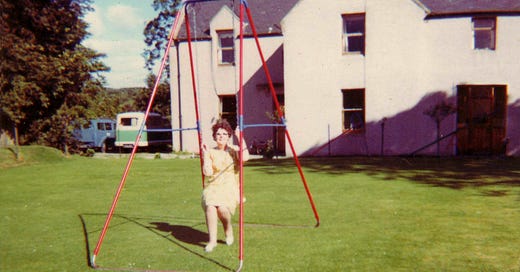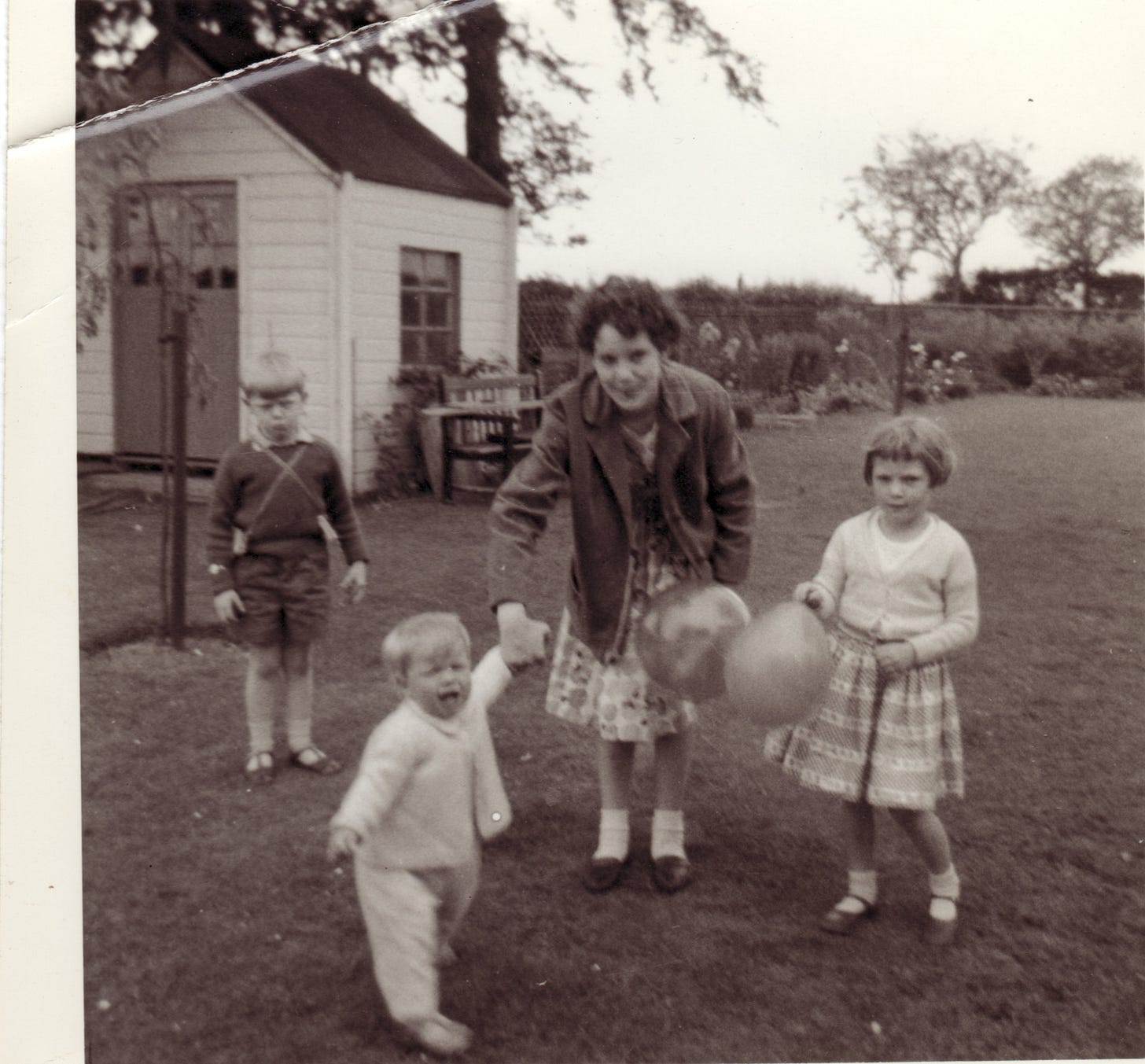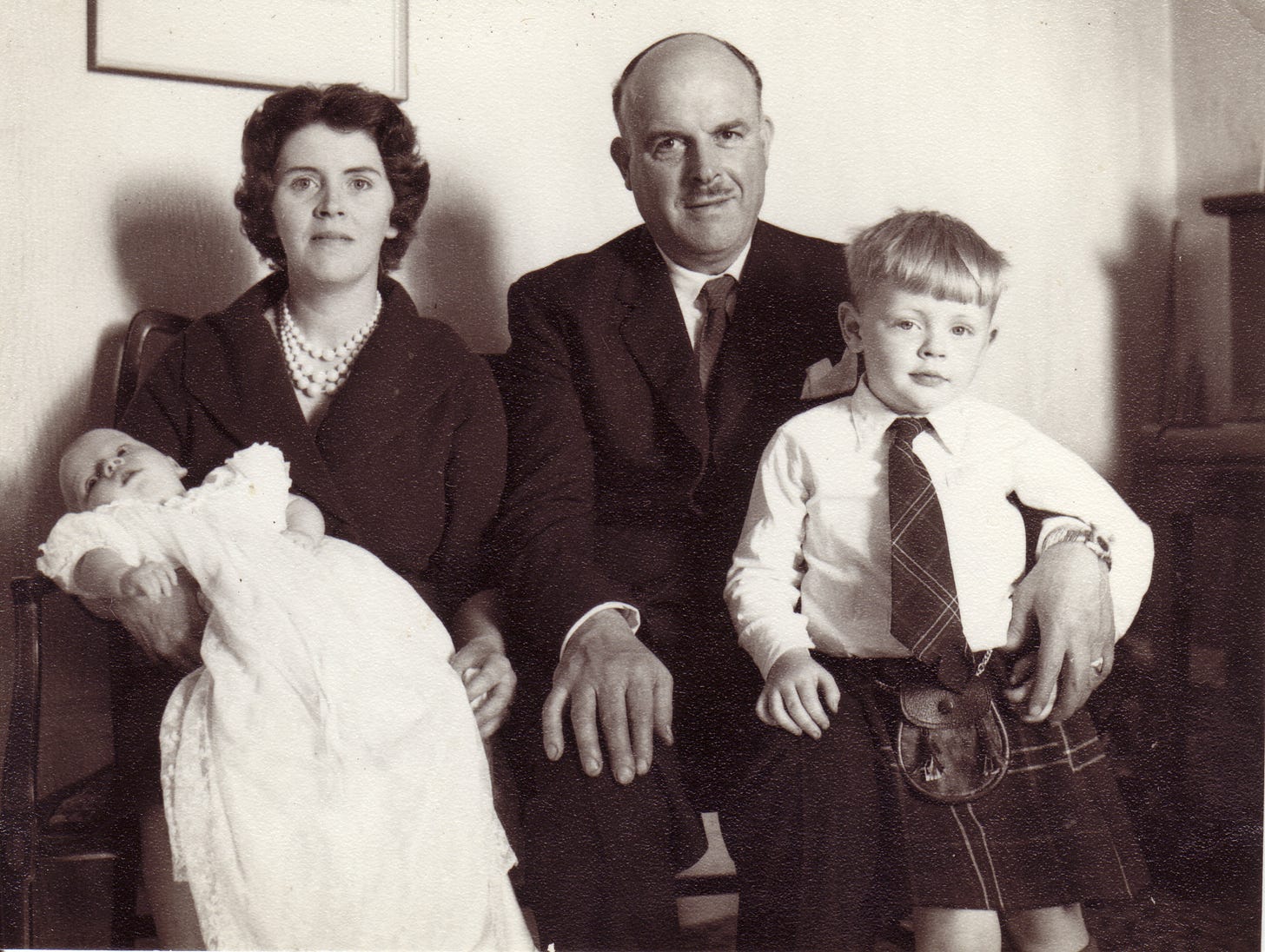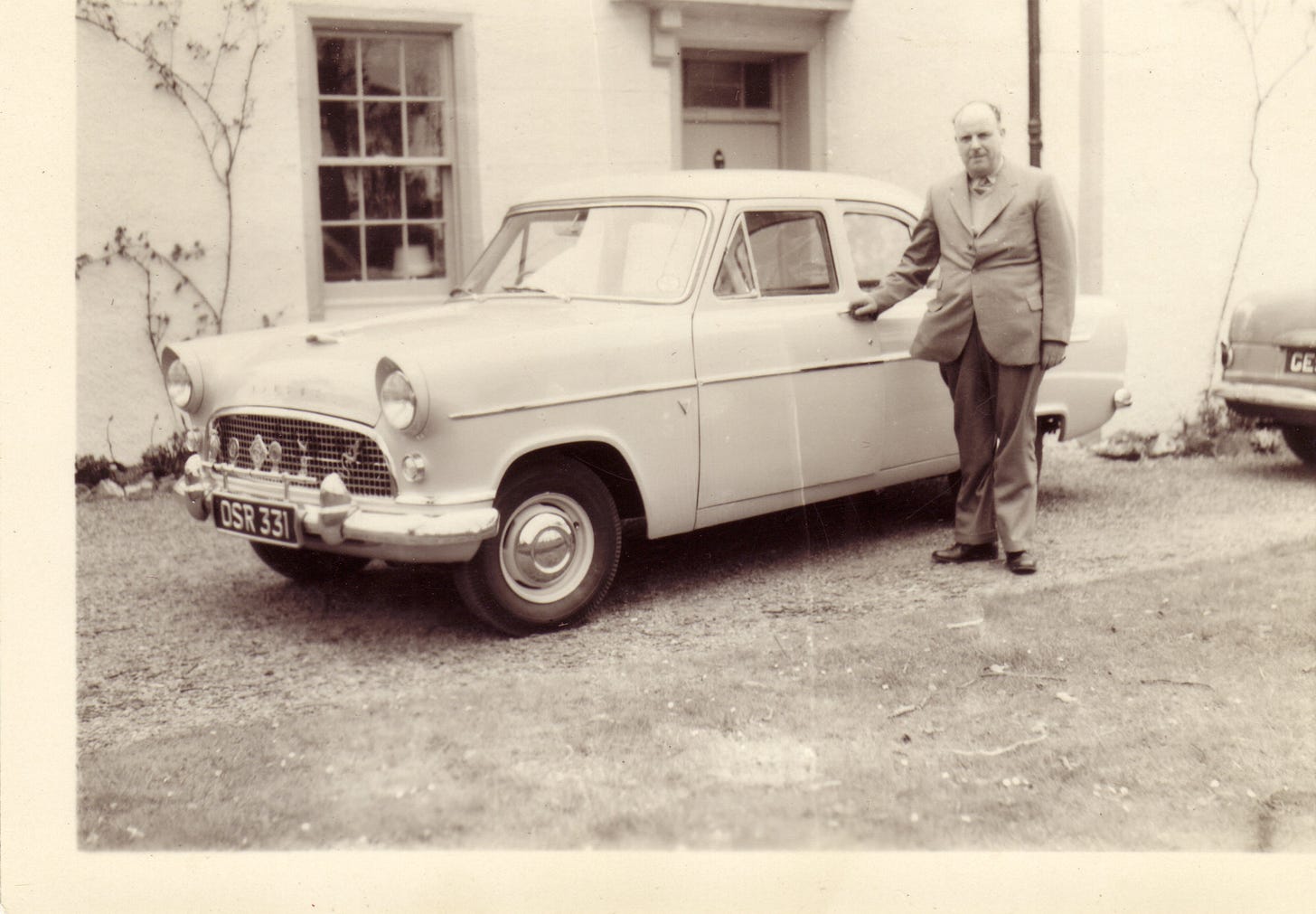Hello and welcome once again to my newsletter. I hope you’ll enjoy this one! It is Chapter One of my new book, which I’ll tell you more about soon.
I grew up in the house of ten thousand dreams. It was on a hill, overlooking the Tay estuary on Scotland's East coast. On clear nights I could see the flash and loom of the lights that stood guard along the shore; the Abertay Lightship, the Bell Rock, away south towards Dunbar they marched, sentinels of security and safe refuge. In the estuary itself, some only visible through binoculars, were the flashing lights of the navigation buoys that marked the safe passages amongst the shifting shoals and sandbars that were so treacherous.
In daytime, from my bedroom window, I could see the ever transforming beauty of the Angus countryside, rolling away to the south, towards Dundee. On the other side of the Tay, beyond the city's smoke, there were the rugged whale-backs of the Lomond Hills and, to the east of them, the dark smudge that was Tentsmuir Forest. Beyond that lay the RAF base at Leuchars, which was, in the Cold War -- though I did not come to understand that concept till much later -- constantly active, with Lightning fighters blasting skywards, trailing their afterburner flames like firework rockets, every day.
Closer by was Carnoustie, a few miles down the hill towards the sea and separated from us by the fields but also the Dundee Road, the A92, which even then was a busy trunk road. To the west of that was Barry Buddon army camp, which, almost every day, rattled with small-arms fire from its range. We could clearly hear it from our garden; like the cooing of doves and the cawing of crows, the distant traffic roar of the A92 and the constant clattering of rifle and machine-gun fire were the background music to our idyll.
Panmure Estate
The house was not huge, although it seemed so, to me. It stood in its own grounds, one of the few like that on what was then the Panmure Estate. The garden was just under two acres in total, but in that space it managed to cram a vegetable plot, fruit gardens, an orchard, a wood and several outbuildings including an air-raid shelter, three full-sized henhouses and three smaller sheds for rearing chicks, as well as garages, workshops and even the 'Shack'. This was a one-roomed timber cottage in the garden that was, officially, a guest room but had become the junk store, where things that were valuable and had to be kept dry, but were not immediately required, were kept. Needless to say, it was a rainy-day treasure-hunting paradise.
There was a lawn and a back drying green, a rose garden and a rockery, along with a hopelessly overgrown shrub garden that we called the 'bush wood'. It was the perfect size for boy adventuring.
To me, this was a place of magic. It was indeed the House of Ten Thousand Dreams, though I did not know its name until much later. This was my Principality, for I was hardly a king, my fiefdom, the place, isolated from the outside world, where anything could be made to happen, any dream realised; all save one.
My first recollections
It is always difficult to be sure what constitutes a real memory of early childhood and what is invented; but there are a number of landmarks to help me. My younger brother was born when I was just turned four and I can clearly remember visiting my mother in the Maternity Ward at Arbroath Infirmary. I remember, too, his first day at home. I had been dressed in my Sunday best, my kilt and jacket, and polished up to look a treat for his welcome-home tea (one did not drink alcohol during the day then, tea and scones, or those strange triangular sandwiches, only).My brother was lying in a cot in what we called the 'living room', probably because it was April and there were only two tolerably warm spaces in the entire house, in those pre-central heating days. Naturally, the room was full of women, most of them fussing over my mother, who was ensconced on the leather sofa with her legs up, 'resting'. These women are but dark shadows now, their faces long forgotten, but it's a safe bet that they were my mother's friends and relatives. I don't remember my father being there.
Other recollection, however, is vague. I remember messing my pants, while dressed in a yellow romper suit, outside the kitchen and then running inside, where the women of the household were, and promptly being stripped and plonked into the kitchen sink to be washed; with considerable good humour although my mother, famously, hated doing it. And I can remember being attacked by a feral cat which I thought had got trapped, in the narrow space between our old wooden greenhouse in the back court and the stone wall behind. Well, I got trapped too, in my mistaken effort to rescue it and the cat made a serious mess of me. I think perhaps it was not persuaded of my good intentions. The resulting mauling provoked a trip to the Casualty Department, as A&E was then called, and the first injection I actually remember -- almost certainly a Tetanus shot. It was not to be my last visit. While I love cats, I have never forgotten that encounter with their race; a hard lesson about cornered felines.
These events, including the arrival of my sibling rival, were traumatic enough to imprint. But other than those, I can't be sure of anything that preceded April 1960, when Hamish came into our world -- and my House of Ten Thousand Dreams.
Knee-Height
The world I inhabited in those early years was populated by a group of figures, nearly all women, whom I observed from knee-height. I was strangely conscious of this perspective, though I could not say I understood it. Everyone towered over me, but they were usually smiling.
My mother, Gladys, was the Queen of this domestic realm. From her, of course, did all things flow; love but also gentle discipline. Her mother, my maternal grandmother, did not live with us -- we were a 'modern' family -- and instead lived in the tenement flat where my mother and my aunt had grown up, in Dundee. But she visited regularly and I remember the long hours these two women spent talking or enjoying the garden, constantly with an eye on me and whatever adventure I was pursuing. By this time, of course, there was always the baby, dressed usually in white, around whom they seemed to revolve.
My mother and grandmother were not the only women in the realm, however. Scottish country houses in those days usually had a 'live-in'. This was what the English call a maid, but we Scots were less high-falutin. Although at the time I did not realise this -- all adults were fantastical, giant creatures to me -- these were young girls of fifteen or so, hardly more than children themselves. Country families then tended to be large, often with seven or eight children and there was little in the way of social support.
Live-ins
Compulsory education lasted only until the age of fifteen, at which time, in the poorer families, boys were expected to get jobs on the farms or in the factories in Dundee, while girls entered service until they were married. Since the lowest age that a girl could marry was sixteen, she was available for work for at least a year, and sometimes, if she were a picky girl (or a plain one) longer. But even plain girls then had ways to lead a lad to the altar, encouraged perhaps, by her strapping brothers and father.
The live-in's room in our house was directly behind the kitchen and shared a common wall with the Rayburn stove, which was always lit, even in summer. This meant that she lived in luxury, since her room was warm, unlike most of the house. It had certain curiosities: it was the only room with bars on the windows and it could only be accessed via the kitchen itself. All through my childhood I assumed these were to stop the girl escaping, as if she were a prisoner, until, many years later, I mentioned this to my mother, who burst out laughing.
'Oh no,' she said. 'It wasn't to keep the girls in. It was to keep the boys out! The girls' mothers insisted on it.' How lucky one was, at age four, not to understand sex or the proclivities of teenage girls keen to find themselves married.
The girls were paid ten shillings a week in wages and had their bus fare home on the weekends, plus, of course, their board and lodging with us. They would leave on Saturday morning and come back on Sunday evening. However, it would appear that they spent the hours away from us doing more than just visiting home.
Indeed, my first understanding of sex -- shrouded in mystery and confusion -- came from whispered conversations at the lunch table, when I would usually be asked to leave while my parents got to the juicy details. They would begin with a comment like 'that girl has done it again' and that a new one would have to be found; at this point I would be told to go and finish my lunch in the kitchen with the very girl herself, my bafflement complete.
Clouds
A certain cloud would come over my mother after these conversations. I think, now, that she formed strong bonds with these girls, yes, seeing them as cousins perhaps, but then, perhaps more. Effectively, when my mother was in the house during the day and my father was absent, she and the girl were inseparable. When we went for a walk, she came too; when we went to explore the nearby hills and look for quartzes, she came and when my mother read the Bible to me in the afternoons, she would be there too, often rocking my baby brother.
I know that my mother became very close to more than one of these girls, who, many decades later, came to her funeral, themselves old women by then. So while my mother certainly understood that the departure of the girl was a blessing, because she would be off to begin her own family, there was also that sense of loss. Fortunately the girls rarely moved further than Tealing or Carmyllie, so they remained in touch with us, regularly arriving to show off their new babies as they appeared.
There would come the sad Saturday when the girl would kiss and hug me more than usual, her face wet with tears, and my mother would have that trying-to-make-the-best-of-it look, hiding her emotions. She would slip the girl a brown envelope, her parting gift and the girl would walk up the drive, lugging her suitcase; and then she would be gone, leaving us to wait for the new girl to arrive. Some months later, she would would appear at the house to show off her newborn, now a proud married woman and mother herself -- at age seventeen.
Warmth and Love
While they were with us, however, these country girls added hugely to the warmth and love that pervaded the house. Really, they were treated like members of the family, cousins on long stay and, in fact, while none of them were related to us, the same families regularly provided live-ins as their broods successively hit the magic age of fifteen and could go out to work. The girls themselves invariably had younger brothers and sisters and were completely competent with children, knowing exactly how to deal with rascals like me and at the same time, how to make me feel loved.
Their duties were not onerous; they had to bank up the Rayburn at night with big coals, then damp it down so that it would not go out in the wee hours; put on the big black kettle to boil water at half past five in the morning; assist in the kitchen and with any household chores where help was wanted, and make the beds; but more complex tasks were off-limits. Mostly they entertained me and my brother and, often, my mother, as she whiled away the afternoons in the living room with us. Making tea was a major part of their lives, it seemed.
Cookie
More responsible culinary duties were performed by our cook, a large, plumptious woman from Arbirlot, some two miles away. Her domain, the kitchen, was the throbbing heart of the House of Ten Thousand dreams: a space given over to women, children and a disparate menagerie of pets, including dogs, cats, rabbits, guinea-pigs, hens and even, from time to time, a pony. I now no longer can recall how many years our cook, always called Mrs Taylor, commanded the kitchen like a warm round Sergeant-Major, never with a scold and always with a smile. I can still see her round face, red with the outdoor life, and her cloud of ringlets just by closing my eyes. She always wore a dark cardigan with the sleeves pulled up and a pink floral pinnie – a pinafore or apron.
I knew that she had sons and daughters of her own and, indeed, one of the latter was our 'live-in' for a time -- and the house was never better managed than with this pair at the helm -- but other than seeing her at church on Sundays, almost unrecognisable in her best, we had little other contact with her. There was very little mixing of the social strata in rural Scotland then.
My mother would deliver Mrs Taylor to her domain at ten in the morning and then, for two hours, incredible aromas would fill the kitchen, attracting me like a magnet. If I had been good (apparently I usually was) I would be allowed a taste of the stew or whatever meal she was preparing. It was always simple enough fare, but good for all that and a spoonful of her gravy was always like nectar. Her soups were amazing, and appeared every day, come hail or shine -- thick barley broths in winter that 'stuck to your ribs' and thinner ones in summer; though she was never really a one for consommés. Her mince was a revelation, a proper mince of just beef and onions and no fanciful modernist nonsense like carrots or peas. It was only improved on when my mother was home and added 'doughballs' – suet puddings – to the mix.
Desserts in summer were always ice-cream -- Wall's Raspberry Ripple, for preference, but sometimes the distinctly inferior, to my taste, Lyons' Maid. In winter there would be apple and rhubarb pies and custard, great vats of steaming custard. As an aside, I have often reflected that, even more than warm flat beer, the definition of Britishness was contained in these two things: tea and custard.
Our custard was not the 'crème Anglaise' of the French. No, ours came in a tin, red, yellow and blue, bearing the legend 'Bird's Original Custard'. I am convinced that there is not a Briton of any flavour, persuasion or class who has not just conjured up an image of that very can in his or her mind. This was the only custard my mother would buy, or for that matter, we would eat – and we ate a lot of it.
Custard
Custard was always served, in the House of Ten Thousand Dreams, at just that perfect consistency, not too runny, as the custard at the school 'soupie' always was, because they thinned it, making it ersatz and disappointing – and not too glutinous, either. It had to gloop off the spoon in precisely the correct slow-motion ballet, smooth and sensual. Combined with a nice rhubarb crumble, these were the nectar and ambrosia of the gods, especially on a bitter January day.
There was little trace of 'multicultural' influence, but our food was wholesome and tasty and we ate like wolves.
Mrs Taylor's sons worked on the farms nearby. These lads and millions like them were never better described than by the anonymous couplet
'Here's tae Mither Tamson's ugly bairns,
Great muckle chiels wi' hairy airms.'
Her sons, being unmarried, and her husband, another of the same ilk who could have stood duty as a barn door, would always go home for lunch and so Mrs Taylor would leave us at noon to lay out the meal she had prepared in the dark morning, before coming to work, in readiness for their arrival at twelve-thirty. On the stroke of twelve she would bundle her copious self into my mother's car and off they would go. Occasionally I was allowed to accompany them but usually I stayed with the girl.
The ‘rural poor’?
In passing, it has become fashionable to refer to the country folk as the 'rural poor'. What an insult. There was nothing poor about these families' lives, even if they did have only one set of 'Sunday Clothes', rode to work on bicycles and thought 'wine' was something the dog did when it wanted out. On the few occasions when I was favoured with a lunchtime visit to Mrs Taylor's house, usually when Mum was away at Dundee and the girl was off sick – or to be married – I was amazed, nay flabbergasted, by the sheer amount of food under which that woman's table groaned. Great basins of boiled potatoes, turnips, carrots and a vast pot of stew, emitting an aroma that made a hungry boy weak at the knees. And then they would come clattering in, the men, joking and laughing, wash their hands, faces and necks at the kitchen sink, and eat the whole perishing lot, while their mother and sisters struggled to keep up the supply.
Nicky Tams
By the by, it was on one of these visits, when I, a wide-eyed little boy, discovered what a 'Nicky Tam' was. Naturally, my father, being a Ford Main Agent and a person of standing in the community, never wore such things, but the Taylor menfolk, who were all farm labourers, did. A Nicky Tam – for those who have not had the undeniable advantage of growing up in rural Scotland – is a length of baler twine (you do know what a baler is, no? Don't worry, we'll explain later) which one ties around one's trouser leg just below the knee.
This has two purposes, as one of the behemothic scions of the household explained, kindly, seeing my interest. One is to lift the hem of the trousers up and so, away from the mud – the 'glaur' – which is of course, everywhere on a farm. This helps to avoid that capital social sin, 'trailin gutters intae the houss', for which one were guaranteed to be chastised, usually at high volume. But the other was more intimate, so to speak. It has been known for a rat, disturbed in its nest in the haystack, to run up the nearest man's trouser leg; the Nicky Tam stopped it below the knee and before it could get to more sensitive parts. I'm sure you will appreciate that having an irate rat in one's underwear is a must to avoid.
Dinner, not Lunch
In the country houses then -- and indeed, all the homes -- lunch, always called 'dinner', was the central meal of the day. It might be better to see 'dinner' here as a translation of 'dejeuner' rather than 'diner'. It had much in common with that French institution that I came to know so well when I was older. Work -- and school, as I was later to find out -- stopped at noon or quarter past and began again at two. On the farms, this was determined by the season, the later workday start, in the winter months when it was still dark in the mornings, cutting into the mealtime.
Unlike the French, adults never drank at lunchtime, at least, not other than the never-ending cups of tea, which were taken with milk and sugar. For the children, there was milk and later, soda drinks. My father had a deal with the local soda drinks maker, Robb Brothers, and there was always a crate of their product in the pantry. That my teeth survived this still amazes me.
Our cook would leave food for the girl to reheat for 'tea', the meal we ate at half past five in the evening. Unlike dinner, we always took this in the kitchen, usually with the girl and often my mother, too. Sometimes she would cook the tea herself rather than reheat or have cold. My father never joined us in these meals; instead, when he arrived home from work he would sit in the living room and watch the television news, taking his tea on a tray.
Breakfast!
The other meal of the day, somewhat out of sequence, was breakfast. Again, we always ate this in the kitchen, because the living-room fire was not lit till later and it was too cold there. Breakfast was, on weekdays, cereal or porridge, salted, with no sugar and drenched in the top of milk, which was pure cream. On Sundays we would have bacon and eggs too, before going to church.
My father trusted no-one else to make the porridge, which he prepared the traditional country way, with 'pinhead' oatmeal rather than flakes. This has to be soaked overnight and then brought to the boil slowly, to prevent it from sticking and burning -- which it does with alacrity; and no Scot can thole burned porridge. But, well done and preserving the slight crunchiness of the broken seeds, it is the best porridge of all, especially if a good big dollop of beef dripping has been melted in and stirred through the pot.
Dripping -- the mark of a superior porridge -- brings me to another tale, or many of them. In the yard outside the kitchen was an old wooden greenhouse that was no longer used and had become the home of a floating population of cats, some of whom were completely feral -- as I had found to my cost. You did not, by the way, want to take too deep a breath in there, especially on a hot day.
Every morning, the cats would crowd on to the kitchen window-sill, yowling impatiently and knocking each other off, watching my father prepare his magic porridge through the window. As he decanted ours into a basin on the table, only a couple of feet away from their noses, the excitement would reach fever-pitch and they would throw themselves at the back door, even hanging from the knob. Dad would take the porridge pot and sally forth, braving the furry melee with a huge grin on his face, while the cats threw themselves at him. He would pour what was left into two big enamelled ashets in the greenhouse, leaving the cats to fight over a place at the table.
So that is how you get cats to eat porridge: add beef dripping. It works on kids too.
This newsletter is free but it would help greatly if you would join my Patreon or consider sending a few bob my way on one of the following:
Patreon: https://www.patreon.com/rodfleming
Buy Me A Coffee: https://www.buymeacoffee.com/rodfleming
On Paypal at: rodafleming@gmail.com
Paypal Me: paypal.me/plashmill
SubscribeStar: https://www.subscribestar.com/rod-fleming-world
GoFundMe: https://gofund.me/8903a2ef
Ko-Fi: https://ko-fi.com/rodfleming














It's almost like I've been briefly transported to rural Scotland 🌞 Thank you for the voyage, Rod !
Cat (no, not one of the feral ones) 🐱